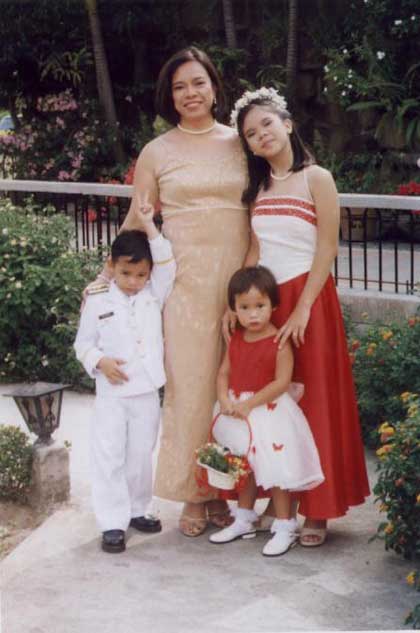One day, many years ago, I fetched my firstborn from preschool and was surprised to find her crying as she got into our car. Apparently, two of her classmates mocked her, calling her, “Poor! Poor!” Unlike them who were fetched by different cars every day, my daughter was only fetched by one car, driven by me. My daughter was crying because she did not understand what poor was, a word we never used at home.“Mama, what’s poor?”“It’s hard to explain in words, palangga,” I gently answered as I drove, all the while racking my brains on how to explain it to her without her feeling bad about herself.
“You can try. I’m smart!” she said in between sobs.
Then we passed by a homeless man sitting on a sidewalk, playing with his matted hair. On impulse, I slowed down and told her, “There. See that man? That’s what poor is like.”
My daughter fell silent for a while as we drove on, apparently deep in thought, her sobs subsiding.
Then, she piped up, “Aha! I know what poor is!”
Me, surprised, asked, “What?”
What she said next floored me.
“Poor is when you have no home, and nobody loves you! I’m not poor! My classmates are wrong!” she beamed at me.
I smiled widely back at her and nodded vigorously in agreement. And we drove the rest of the way home in brighter spirits, the issue of defining “poor” was over.
My parents grew up in World War II, and they raised me in a home where money was almost an idol. It reminded me of this quote: “The world will laugh at you and trample on you and use you if you’re without money.”
Everyone in my family slaved for money. From the time we knew how to count, we worked at our general merchandise store and bakery doing odd jobs and eventually rising to the position of the cashier by the time we reached high school.
It was good business training and left us with solid life values, work ethic, and discipline. But we also had no family life to speak of outside the family business.
During the Christmas holidays and even during Lent, when other people enjoyed vacations with their families, we worked at our family business double-time because those were also the times when business was busiest, and sales were at their peak.
Rest was a sin.
So when I had my children, I wanted them to grow up to see money as a means to more valuable ends. I did not want them to see money as the source of their identity and joy. I wanted them to live with financial limitations happily. I showed them that "being poor" was a state of mind.

During those early years of my solo parenting journey, there were days when I didn’t have enough money for gas or public transportation, but we had food stocked at home to last us until the next payday. One time, I told the kids we could all stay home and not go to school and work. While I worked on my papers in our little garden, the children played around me, creating variety shows and inventing games they insisted I joined. We had fun that way. I didn’t tell them it’s because we didn't have money.
Because of our financial situation, the children did not grow up dependent on toys. They learned to be creative and to mine and enjoy the products of their fertile imaginations. I bought them reams of bond paper and colored papers and pens for their arts and crafts. I read them stories and never scrimped on books.

I didn’t want my kids feeling deprived like they couldn't even dare dream just. I wanted them to feel like they can have anything they wanted; it would only take time and work and a little more dreaming and praying.
One Sunday before payday, I had only P50 left. The kids wanted to go to the nearby mall to play at their free fun park. I discussed it with them, “You know you can’t just play and not eat. You know you’d go hungry after playing.”
Their suggestions made me teary-eyed, “We could have yaya make us sandwiches and juice to bring! Or we could just go home and eat after we play!”
So I told them about my P50. “Well, actually, we could buy a hotdog sandwich there and a soft drink. We’d just have to share them, though. Is that alright with you?” They gleefully said, “YESSS!”
I still remember that moment we sat down to enjoy our “shared snack.” Each one of them slowly ate their share of the hotdog sandwich, sipped from the soft drink straw, and passed it to the sibling beside them. When the last sibling had eaten, they even offered me some.
I said, “Nooo, it’s all for you. I enjoy watching you eat.” And they said, “Mama, we made sure to save some for you. Eat.”
My children are grown now. The eldest is already 25, residing in the United States, newly married. My middle son is a Materials Engineering junior student. My youngest daughter is in Grade 11. All are carving out their lives, going for their dreams, living from their souls.
I’d like to believe that the way they had to deal with life’s harsh realities and limitations gave them a healthy hunger to go for more in their own lives. They had grown up to be savers when I never even consciously taught them to save.
Beyond finances, I see them making intelligent choices when it comes to their friends and activities. They aren’t easily fooled by appearances; they are good judges of character. They are self-respecting and kind, never blaming nor complaining. Their friends look to them for leadership. Their friends’ parents would allow their sons and daughters to go to an event if they know my children will be there.
My kids are good at dealing with different types of people and situations with grace. They know how to enjoy themselves even with little money.
One Christmas a couple of years back, I asked them what they remember of their childhood with me. All three said it was fun, and it was too bad we had not been absent a lot anymore hahaha!
But I insisted. “Didn’t you feel deprived, that sometimes we couldn’t afford things that you wanted?”
My eldest thought some more and said, “No, Mama. What we remember was that we felt light and happy, especially when the tight times came. It brought out our genius!”One child growing up fine may be luck. Two may be uncanny luck. But three? As a solo parent at that?
By God’s Grace, I must have done something right, huh?*
Jeanette C. Patindol is the PBBY Alfredo Salanga Prize-winning author of Papa's House, Mama's House in 2004 and Tight Times in 2007. Both children's books are published by Adarna. She is also an assistant professor at the University of St. La Salle in Bacolod City, teaching courses in Economics, Interdisciplinary Studies and Communication in Conflict.


